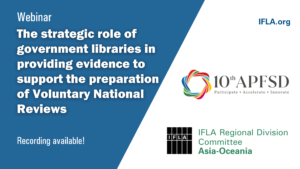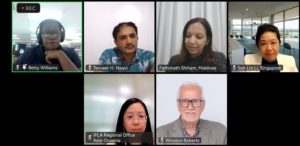Recording available: The strategic role of government libraries in providing evidence to support the preparation of Voluntary National Reviews in Asia-Oceania
24 4 月 2024

On 30 March 2023, the Regional Division Committee of IFLA for Asia-Oceania delivered a short regional webinar on “the strategic role of government libraries in providing evidence to support the preparation of Voluntary National Reviews”.
The webinar was part of a programme of online events held alongside this year’s Asia-Pacific Forum on Sustainable Development (APFSD) organised by the office on United Nations Economic and Social Commission for Asia and the Pacific – UN ESCAP in Bangkok. The APFSD was a physical meeting in Bangkok (at which IFLA was represented), but the side events were virtual.
The IFLA side event was organised by Winston Roberts (Chair, IFLA Regional Division Committee for Asia-Oceania) with the help of the IFLA Asia-Oceania Regional Office based in Singapore.
Watch the recording
Key questions & messages
The key questions discussed in the side event, by a panel of library sector leaders from the region, were:
- How to make funding for library services sustainable in difficult economic circumstances, by developing ways to assess the intangible economic benefits of social capital?
- How to leverage library services to help increase basic literacy and digital literacy in the information society?
- How to innovate in library services to keep them responsive to social change, in countries at different stages of development?
- How best to communicate national results in those areas to UN planners and the High-Level Political Forum?
Key messages from the webinar were that publicly funded library services and networks reach into many sectors of society and the economy, supporting progress in (for example) education, health, business and research. Managers of these services are informed about national developments; they provide data and advice to assist policy and decision-makers. Government libraries in particular are repositories of such evidence, which can be used by officials compiling a Voluntary National Review (VNR) of progress towards the UN SDGs.
Similar conclusions were reached by all 4 presenters – Fathimath Shiham (National Library of the Maldives), Tanvir Naqvi (Library Services of Fiji), Lin Li Soh (National Library Board of Singapore), and Betty Eni Williams (Library of the Reserve Bank of Vanuatu).

The presentations are available at the below links:
- National Library of Maldives experience with VNR 2023: https://repository.ifla.org/handle/123456789/2613
- The case of Vanuatu: strategic role of government libraries in providing evidence to support the preparation of VNRs – 1th APFSD Side Event Concept Note (IFLA): https://repository.ifla.org/handle/123456789/2611
- Telling the tale of Libraries and SDGs: The National Library Board, Singapore’s experience: https://repository.ifla.org/handle/123456789/2612
- Government Libraries in providing evidence to support the preparation of Voluntary National Review (VNR) for Fiji: https://repository.ifla.org/handle/123456789/2614
It was apparent from the evidence presented by these IFLA experts that it would be desirable for countries to take the following actions:
* make arrangements for regular consultations between library sector leaders and officials responsible for national periodic reporting to the UN;
* include in their VNRs notes and data received from their national library services;
* explicitly acknowledge the role of such services in society and the economy by reference to available indirect measures such as budgets, literacy statistics, education outcomes, etc.;
* comment in their VNR on the relationship between their national investment in library services and their policies for reducing the digital divide, reducing social inequalities, and enabling citizens’ access to economic opportunities.
Conclusions
IFLA’s Regional Division Committee for Asia-Oceania suggests that the following conclusions may be drawn from the situation described in the webinar presentations:
- In some countries there is less than adequate policy linkage between publicly-funded library services and national government agencies. In such cases there is a risk that data and evidence held by the former may be overlooked by the latter. Alternatively, aggregated national data may be correctly reported but the contributions (costs and benefits) of individual sectors may not be fully recognised.
- It is essential that the cost of modern information services be factored in to integrated national planning in the digital era.
- National library institutions and their professional associations already cooperate with government agencies at national, regional and international levels, but more can be done.
In the Asia-Pacific region, IFLA frequently arranges meetings for its members on working toward the SDGs, and will continue to do so. IFLA looks forward to continued engagement with ESCAP in this work, and plans to participate in regular UN reviews of progress.
We re grateful to Winston Roberts for this report on the event.
* Read more about
IFLA’s Asia-Oceania Regional Office: https://www.ifla.org/regional-offices/
IFLA’s Asia-Oceania Regional Division Committee, their news, events and plans: https://www.ifla.org/units/asia-oceania-regional-division/
Voluntary National Reviews: https://www.ifla.org/libraries-in-voluntary-national-reviews/
United Nations Economic and Social Commission for Asia and the Pacific – UN ESCAP: https://www.unescap.org/
Asia-Pac Forum on Sustainable Development: https://www.unescap.org/events/apfsd10